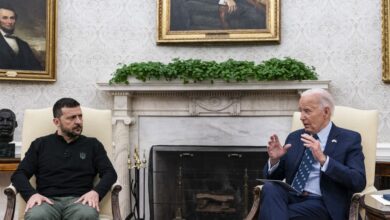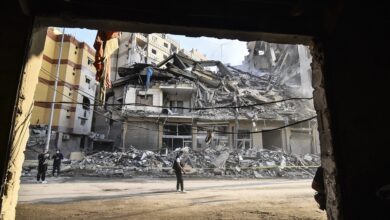SDF denies exchanging ISIS families for Syrian Kurdish prisoners
Syrian Democratic Forces spokesperson demands evidence or apology over claims that they sent Moroccans back to ISIS
The Kurdish-led Syrian Democratic Forces have denied media reports that wives and children of ISIS fighters and children are being exchanged with Islamic State for Kurdish prisoners.
The Morocco-based Northern Observatory for Human Rights (ONERDH), said in a communique last week that it had received messages from Moroccan women urging the government to intervene and stop the SDF from handing them to ISIS in a prisoner exchange, Yabiladi reported.
The Observatory claimed that more than 35 pregnant women with about 50 of their children have been handed over to ISIS members.
A lawyer who represents some of the wives of ISIS fighters in Syria told The Defense Post that there are rumors inside the camp that holds ISIS wives that buses from the camp have picked up women and sent them back ISIS-held territory.
Some of the women were afraid of being sent back to ISIS territory, he said, speaking on condition of anonymity out of concern for his clients’ safety.
The spokesperson for the SDF denied the allegations.
“We had a lot of reports like this about Moroccan, or different people, but it’s not something we do and there is no point in doing it. We deny these claims about such reports and we have nothing to do with such claims,” Kino Gabriel told The Defense Post.
Furthermore, Mustafa Bali, the head of the SDF media center, rejected the reports in a public statement and demanded an apology from the Observatory.
“SDF did not hand over Moroccan women to ISIS in exchange for anything, and this Moroccan organization’s statement is not true, and we demand it provide evidence or apologize to SDF,” he said.
Bali said that the Moroccan government was informed about the presence of its citizens among ISIS fighters, their wives and children, but that the Moroccan government is not ready for the return of its citizens despite the SDF’s appeals.
“We have not received any response from the Moroccan government yet,” he said.
The Syrian Kurds have previously called on countries to take back ISIS families and men. So far, only Russia and Indonesia have officially taken back women.
Nevertheless, there are also other reports that suggest ISIS wives and children were sent back.
The Belgian intelligence service VSSE in a document obtained by German Bild journalist Björn Stritzel from April 25 claims that, according to their reliable resources, women and children of ISIS fighters in the Kurdish refugee camps al Roj and al Hawl were sent back to ISIS territory.
Moreover, a Dutch ISIS wife, Meryem, told Dutch documentary maker Sinan Can in May that she was afraid that she would be sent back to ISIS in a prisoner exchange.
“There were women put on a bus, and tomorrow others will go and I am afraid I am on the list of names. I do not want to go back to this area,” said Meryem, who is still in Syria.
It remains unclear why ISIS leaders would want to have children and wives back and take care of them, while they are under siege in two small pockets of land in Deir Ezzor province by a U.S.-led Coalition offensive.
Kurdish authorities lack financial resources to host the wives and children, the Belgian intelligence service said in the report.
The Coalition is also worried that the SDF detention centers could become a breeding ground for radicalism, and has called on allied countries to take back their foreign fighters.
“So our Syrian Democratic Forces partners have adequate facilities right now to house and care for the detainees. As you can imagine, it is a drain on their resources. They are not a policing organization,” CJTF-OIR spokesperson Colonel Thomas F. Veale told reporters last week.
“We wish they could dedicate all their resources to doing the work they’ve done so well the past three years, which is kill and capture ISIS. So that’s – that’s why we’re calling on the international community, because there are citizens of various nations in detention there that should go home to face justice. That’s not an SDF job,” he added.
The Coalition has repeatedly called for a solution for the hundreds of ISIS fighters and families who remain in prisons and refugee camps.
“Each of us also has an urgent responsibility to address the foreign-fighter detainee problem,” U.S. Defense Secretary James Mattis said after a Coalition meeting in Brussels this month.
“We all must ensure captured terrorists remain off the battlefield and off our streets by taking custody of detainees from our countries or quickly coming up with suitable options.”
“We in the U.S. face the same problem, and we are working diligently to find a way to solve it. Abrogating this responsibility is not an option, as it plants the seeds for the next round of violence against innocents,” he added.
In a February meeting, Coalition countries failed to agree on what to do with foreign fighters and their families captured in Syria. The U.S. suggested repatriating detained fighters to their home countries for prosecution, but most European Coalition countries rejected this.
Veale told The Defense Post that the Coalition does not have any information about the claims of women being sent back to ISIS territory.
“But we can assure you that the Coalition does not endorse this kind of behavior,” he said. “While we continue to support our Syrian Democratic Forces partners to ensure the lasting defeat of Daesh, we cannot speak directly to the details of this allegation.”
“We refer you to the Syrian Democratic Forces on this issue. We urge all nations with citizens in detention as ISIS fighters to come forward and bring their citizens to justice,” he concluded.












